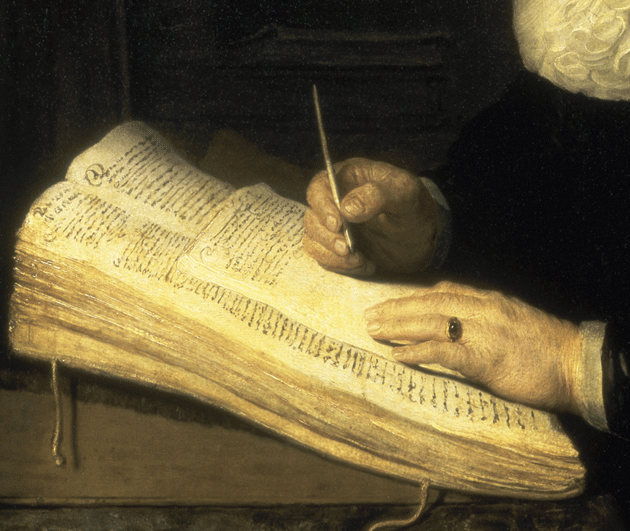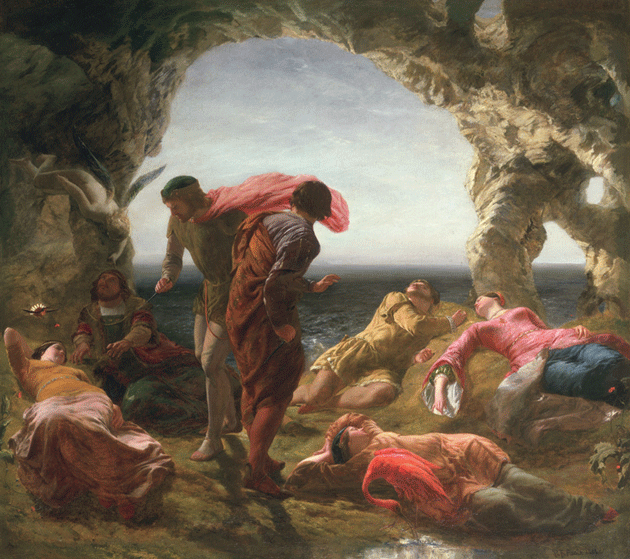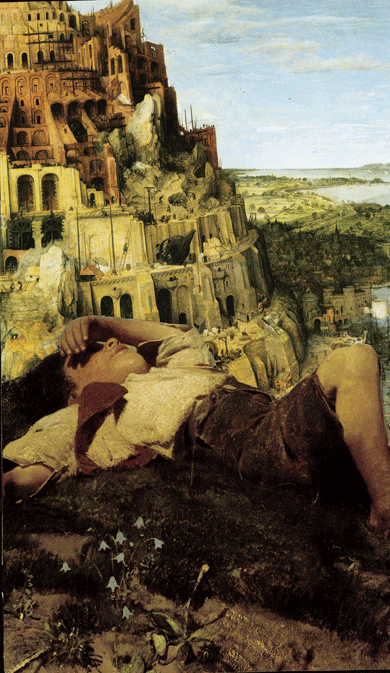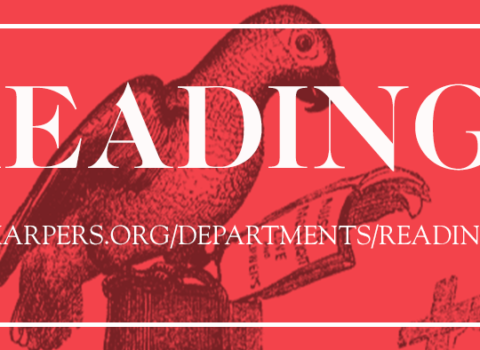John Florio — lexicographer, raconteur, and supposed model for Shakespeare’s schoolmaster Holofernes, in Love’s Labour’s Lost — was born in London in 1553 to an unidentified Englishwoman and an Italian Protestant who’d fled the Inquisition. Later that year Queen Mary I reinstated Catholicism, which sent the family packing for France, Germany, and Switzerland. Florio didn’t return to London until the reign of Elizabeth I, and subsequently served as Italian tutor to Queen Anne of Denmark, wife of James I, who gave the Church of England a Bible and so gave English to God. Florio’s posterity consists of twin ironies. The first is that despite compiling the first comprehensive Italian–English dictionary, Florio most likely never set foot in Italy. The second is that his most enduring translation happens to be from the French.

Portrait of a Scholar (detail), by Rembrandt van Rijn © The Art Archive/Hermitage Museum, Saint Petersburg/Superstock
Florio’s 1603 version of Montaigne’s Essayes survives not because of its writing but because of a single reader — Shakespeare, whose initial encounter with the French philosopher was via Florio’s “enflourishing” eloquence. Stephen Greenblatt and Peter Platt have annotated selections in Shakespeare’s Montaigne (NYRB Classics, $17.95), and the result is a crash course in Elizabethan lit, a multiculti study of the development of English, and, above all, a revisionist biography of a monumental dramatist who not only cribbed the classical education he lacked but also responded to his sources with a fierce and censorious intelligence.
Montaigne’s presence behind Shakespeare’s scenes was already remarked upon, and lampooned, in the Bard’s lifetime. Ben Jonson’s Volpone proposed a Florio-like Italian writer from whom “All our English writers . . . Will deigne to steale . . . Almost as much, as from MONTAGNIE.” By the time the variora of the plays had been assembled, in the late eighteenth century, the influence was such a matter of record that an unscrupulous party forged the signature of “Willm Shakspere” on a copy of Florio’s work and sold it to the British Museum. Emerson, who regarded the signature as genuine, noted that when the museum bought a second copy, for public use, the volume contained the — authentic — autograph of Jonson.
Approximately 750 words peculiar to Florio’s style show up in Shakespeare’s plays and sonnets after 1603, twenty of them used in the Essayes for the first time (or for the first time in English). In “Of the Cannibals,” Florio’s Montaigne writes that the just-discovered peoples of the New World
hath no kind of traffic, no knowledge of letters, no intelligence of numbers, no name of magistrate, nor of politic superiority; no use of service, of riches, or of poverty; no contracts, no successions, no dividences, no occupation, but idle; no respect of kindred, but common; no apparel, but natural; no manuring of lands, no use of wine, corn, or metal. The very words that import lying, falsehood, treason, dissimulations, covetousness, envy, detraction, and pardon, were never heard of amongst them.
Compare this with Gonzalo’s fantasy after he’s shipwrecked on the island of The Tempest:
I’th’ commonwealth I would by contraries
Execute all things; for no kind of traffic
Would I admit; no name of magistrate;
Letters should not be known; riches, poverty,
And use of service, none; contract, succession,
Bourn, bound of land, tilth, vineyard, none;
No use of metal, corn, or wine, or oil;
No occupation; all men idle, all;
And women too, but innocent and pure;
No sovereignty; —
. . .
All things in common nature should produce
Without sweat or endeavour: Treason, felony,
Sword, pike, knife, gun, or need of any engine,
Would I not have; but nature should bring forth,
Of its own kind, all foison, all abundance,
To feed my innocent people.

Scene from “The Tempest,”by Paul Falconer Poole © Forbes Magazine Collection, New York City/The Bridgeman Art Library
Jonson’s accusation of theft rings true, but only if the criterion is verbiage. The conceptual usages are crossed. Montaigne’s unexplored utopia is meant in earnest; Shakespeare is poking fun at both his character and his source — at the leisurely, moneyed abstractions of gentleman metaphysics. Shakespeare takes the same approach to “Of the Affection of Fathers to Their Children,” in which Montaigne directs the aged patriarch to entrust his fortunes to his offspring, who will provide for him, which is precisely what doesn’t happen in King Lear. This is the basest element Shakespeare dug out from Florio’s Montaigne: an innocence, or naïveté, to react to. Because Montaigne was an essayist, he had to state his ideas, which, if they came into contradiction, he had to either acknowledge or resolve. Shakespeare, writing for the stage, costumed each of his characters in the rhetoric of an essayist, and in their conflicts they dramatized ideas. The playwright, who altered histories, bent time, and insisted on locating landlocked Milan, Padua, and Verona on coasts, plagiarized not out of ineptitude but out of vengeance. Each of his quotations is a commentary.
In “That to Philosophize Is to Learn How to Die,” Florio’s Montaigne insists, “Our religion hath had no surer human foundation than the contempt of life.” Montaigne’s “contempt of life” is mespris de la vie, a phrase Jean-Baptiste Chassignet filched for his 1594 sonnet cycle Le Mespris de la vie et consolation contre la mort. In the 1970s, John Ashbery, dean of American poetry, put six of the sonnets into English as The Vanity of Life and Consolation Against Death.
Translating French into English became Ashbery’s own brand of consolation, which he started offering to his New York friends — who became the New York School — during his time living in Montpellier and Paris between 1958 and 1965. Ashbery’s Collected French Translations (Farrar, Straus and Giroux) fills two volumes, one of poetry ($35), the other of prose ($30); the editors, Rosanne Wasserman and Eugene Richie, supply each with a co-authored introduction. The intros begin with verbatim pages but then digress, double back; the cumulative effect is shifty, confusing, surreal.
 But that effect is to Ashbery’s taste. He’s rendered poetry by Rimbaud, Max Jacob, Paul Éluard and André Breton, and Éluard and René Char; and by Pierre Martory, whom Ashbery lived with in Paris but translated only in the 1990s, the final decade of Martory’s life. Ashbery’s grasps at his former lover’s images and sounds are grasps at recapturing youth, and the bilingual layout emphasizes the futility of the endeavor — the French presented before, facing the future page of, the English:
But that effect is to Ashbery’s taste. He’s rendered poetry by Rimbaud, Max Jacob, Paul Éluard and André Breton, and Éluard and René Char; and by Pierre Martory, whom Ashbery lived with in Paris but translated only in the 1990s, the final decade of Martory’s life. Ashbery’s grasps at his former lover’s images and sounds are grasps at recapturing youth, and the bilingual layout emphasizes the futility of the endeavor — the French presented before, facing the future page of, the English:
I am ready to give up the trees and the cities
But I still hope to receive you, my soul,
Laden with my own eternity.
You who are me, who resembles nobody,
You that I must give back someday to who knows who.
The prose installment features a dialogue between Fear and Love by Alfred Jarry, a rejection letter from La Nouvelle Revue Française to Antonin Artaud, excerpts from Raymond Roussel’s preciously lunatic Impressions of Africa and Documents to Serve as an Outline, and portions of two novels by Giorgio de Chirico — Hebdomeros and Monsieur Dudron’s Adventure — which succeed at a more subtle form of translation: they are paintings on the page, static scenes drawn starkly.
Not included is the French pulp fiction that Ashbery translated for the mass-market publisher Dell, Murder in Montmartre and The Deadlier Sex. Apparently the books’ respective authors — Noël Vexin and Geneviève Manceron (both pseudonyms) — hadn’t anticipated the erotic demands of American noir, and so “Jonas Berry” (a transliteration of how the French pronounce “John Ashbery”) had to pornify a handful of passages himself. John Banville’s nom de plume is smoky, jokey “Benjamin Black,” who after seven Eurocentric crime thrillers has released The Black-Eyed Blonde: A Philip Marlowe Novel (Henry Holt, $27), a book starring the immortal but still getting-too-old-for-this-shit Philip Marlowe, reauthorized for service by the estate of his creator, Raymond Chandler.
Actually The Black-Eyed Blonde is the third post-Chandler outing for Marlowe: in 1989 Robert B. Parker completed Poodle Springs, which Chandler had abandoned, and in 1991 he returned with Perchance to Dream, a wholly new sequel to The Big Sleep (with a tip of the fedora to Hamlet). Parker was a largehearted hack who also scripted for film and TV (Spenser: For Hire); this passing of the license to Banville is a bid for literary class that a sober Chandler would’ve appreciated and a drunken Chandler would’ve jeered at. Banville has never tried to conceal his alter ego, and yet he has always asserted that his own novels are “art,” the Black productions “craft.” Banville’s Shroud, Eclipse, and Ancient Light were about the erotic disappointments of the cultural elite; his Revolutions Trilogy, about the perils of scientific inquiry, focuses on Copernicus, Kepler, and Newton. Contemporary L.A. was enough of a beat for Chandler; occasionally he’d fictionalize a suburb.
Banville/Black is Irish Catholic and sweats it; Chandler, of Irish stock, was a lapsed Protestant from Chicago who, after his alcoholic father left, was taken by his mother to sponge off relatives in London. He was educated at Dulwich College, became a British subject, and toiled at the Admiralty before trying journalism, America again, and a brief spell with the Canadian Expeditionary Force, which fitted him with a kilt, shipped him to France, and involved him in the last trench combat of WWI. After the armistice he resettled in L.A., into the employ of the Dabney Oil Syndicate, which promoted him from bookkeeper to vice president and then fired him for alternating bouts of absenteeism and secretarial lechery. In Marlowe he typed up his appetites, making that shadow self he craved: a disbarred Perry Mason, a Sam Spade channeling Camus and Sartre.
The Black-Eyed Blonde is dutiful to that legacy. Marlowe still likes gimlets, anything brown, Camel cigarettes, easy women, hard chess. Black has even reunited the more companionable cast members of the canonical novels, including Bernie Ohls, the D.A.’s chief investigator, and Terry Lennox, a grifter left alive at the end of The Long Goodbye but left for dead at the end of Robert Altman’s 1973 film. Elliott Gould, Humphrey Bogart, Robert Mitchum, Dick Powell, George Montgomery, Robert Montgomery, James Garner — all have drifted in and out of the Marlowe role; none have defined it. Chandler’s strong prose trumps the screen, though it helps that Marlowe describes himself in the books only when he’s bleeding.
Black’s plot is faithful, too, as a mess and an amalgamation. The drugs from Farewell, My Lovely are back, not as marijuana — which is nearly legal in California nowadays — but as heroin. The gaudy mansion from The High Window has been redecorated and relocated to abut the Pacific. The trope from The Lady in the Lake of the murderer assuming the victim’s identity has been flipped around: the victim is misidentified as the murderer. Clare Cavendish, Marlowe’s client who sets all this to spin, is the titular blonde, and her black eyes are natural, too, though if her dalliance with the gigolo Nico Peterson were aired it would be bruising for her mother, an Irish immigrant turned perfume tycoon.
Black so overdoes the Anglo-Irish touches that L.A. comes to seem a gritty outpost of Empire: “Lanigan’s was one of those pretend-Irish places with shamrocks painted on the mirror behind the bar and photographs of John Wayne and Maureen O’Hara in glowing Technicolor framed on the walls.” Later:
I sat at a table in a corner and ordered a roast beef sandwich and a tankard of ale. They served it warm, just like they do down Lambeth way; as to the sandwich, you sure take a sober view of matters while chewing on a slab of overcooked beef as tough as an Englishman’s tongue.
A mafia don is chauffeured about in a right-hand-drive Bentley and has “a plummy, put-on British accent.” A philanthropist country-club Brahmin dresses like a Hollywood Comanche but is named Wilberforce, after “the great English parliamentarian and leader of the abolitionist movement”; he’s a racist, of course, and he speaks like a Bond villain.
West Coast Anglophobia is strange enough, but it’s especially disorienting from a “Marlowe.” Chandler’s hero wasn’t named after Shakespeare’s rival directly, but after Marlowe House, a student society at Dulwich, which was founded as a school for the indigent by the stage actor Edward Alleyn, who debuted the roles of Tamburlaine and Faustus. The detective Marlowe is shot at, sapped, water-tortured, and slipped mickeys throughout Black’s novel; the historical Marlowe was most probably stabbed to death in a bar brawl in 1593. Scholars are split over whether this incident was related to his possible career as a spy for the Privy Council, which reportedly also employed Florio, gathering intelligence from the French Embassy.
The best clue the tenured sleuths have to the nature of the two writers’ relationship is a neologism, “misbelief,” which appears twice in Florio’s Montaigne and twice in Shakespeare (Titus Andronicus, The Merchant of Venice) but takes its earliest bow in Marlowe’s The Jew of Malta: “My sinful soul, alas, hath pac’d too long / The fatal labyrinth of misbelief.”





























































































